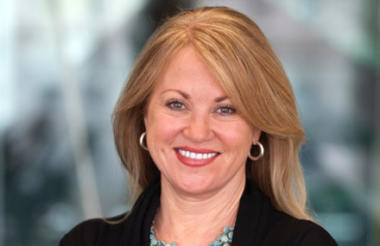Laurie Benson became Charity Commission’s ‘digital’ board member last November. She tells Civil Society what motivated her to get involved and how she’s finding it.
How did you become involved with charities?
I am an American, but I am also a citizen of the UK, and I have been here for thirteen years. My first interest in the charitable sector as a whole was a desire to really embed myself into UK society.
I am struck by the charity sector as a whole, its place in society here, as well the complete involvement by society with charity here. I very much wanted to be part of that.
My first role was with the RAF Museum. I was very much drawn to doing that by the sheer power of British history and what the RAF meant and the role it’s had in shaping the world.
Why did you want to join the board of the Charity Commission?
It was actually put to me through the Public Appointments Office, with them knowing my background and my skillset and also being very clear in what the Charity Commission needed as an addition to the board.
I would call myself a student of change. I have spent my entire career facing the winds of change. I started out at CNN in the really early days. This idea of the changing media landscape and how society interacts with media and technology has been my entire career.
So I've been able to take that experience and translate it into helping organisations understand the digital landscape, its challenges, but also most certainly its opportunities.
The Charity Commission is not alone, as is the RAF Museum not alone, in needing to embrace digital and transform their organisations but also realise the efficiencies that it can garner.
For me the Commission was a wonderful opportunity to be further engaged in an organisation that is so engaged in UK society.
To me it’s actually quite an honour to think that I might actually have some impact and help it transform for the future.
How have you found it so far?
It’s a lot more time than I thought I was going to spend on it – but as I said it’s so fascinating I don’t mind.
Also I was really quite impressed by the team – the passion, the competency. It’s a very well informed group of people. I've been impressed by their commitment despite challenging times and years of declining budgets.
This organisation is committed to charities being the best that they can be - that was my first impression. And they work very hard.
What do you hope to achieve?
I really want see this organisation be on a firm footing for the future, which is going to require a digital-first mentality.
Digital technology today will not only serve charities themselves as they will be looking to their own activities and how they can use digital, but also it will allow them to work with the Commission in a way that feels more reactive, seamless and easier and maybe even more pleasant.
But it’s not just interacting with the charities that needs to happen. The organisation itself needs to address its challenges with digital technology. This transformation is part of that and it’s happening already.
The outside world has not yet seen how much has already been done at the Commission. The digital services that we’re launching at the end of this month is really the beginning of all of this.
It will almost be a snowball effect, because once those services are in place we’ll be able to run our own internal more efficiently without more resources, but also learn more about the challenges of the sector and be more helpful to the sector because of that.
What reaction have you had from charities?
I have made it a point to travel and attend events. I am wildly impressed by the commitment of the sector. They are passionate about the cause. They want and need a lot from the Commission and the Commission is transforming itself to hopefully give them exactly what they need to be successful.
Where do you stand on the issue of charging charities for regulation?
We’re spending a lot of time on that issue. It’s a very debatable issue and there’s nobody who likes to ever hear those words, so fair enough. But certainly we’re not going to do anything without consultation with the sector.
William Shawcross has committed to making sure that we listen and hear and understand. And we understand that this is going to require showing the sector that it would be beneficial to them.
It is clear to the sector that they need a strong regulator and to be a strong regulator we won’t be able to continue to go on as we are now. So the number one benefit is to uphold public trust and confidence because we are a strong proactive regulator.
The new technologies and potential funding would allow us to regain focus on enablement and support charities better.
What opportunities does technology offer charities?
The most obvious opportunity is communication with their donors and their beneficiaries.
Here’s the bottom line with what’s going on with digital technology: that’s where people are spending their time. You need to communicate with people where they are.
The reality is that they are interacting in the digital world so charities really will miss an opportunity if they don’t stop to think about ‘how do I make use of this technology?’
Some of it doesn’t have to be so difficult. It can be some of the simpler social media pages. But if you think about fundraising, outreach, streamlining their own charities, and being able to communicate with their own beneficiaries.
It will depend on the size and sophistication of individual charities but the Commission now has a piece of advice out there Making digital work: 12 questions for trustees to consider. I would recommend that as a first step for anyone just to start thinking about it.
Is it fair to say that charities ‘lag behind’ other sectors when it comes to digital technology?
No. I think that people are much more digitally savvy than they like to admit.
It seems scarier than it probably is. The reality is there are some people who are just afraid to touch it and that’s why the new Lords report suggested that charities put somebody with digital expertise on their boards.
At that point I would say that it’s important for other board members to learn about the digital world from their digital trustee.
I was put on the Charity Commission board as a digital board member. I was put on the RAF Museum as their digital trustee. A charity almost any size can do that and from there will filter down a more digitally savvy organisation.
I would say that I enjoy my complete role at the Commission and I am also very passionate that we do the right thing on behalf of the sector and so I very much appreciate working with William Shawcross, the rest of the board members, and the executive team.
I think that I have the ability to help shape things beyond just digital, which is important to me personally.
Have you got any advice for others with digital background about getting involved with charities?
The good news for somebody with digital experience looking for a trustee role is that almost every board knows they need one, so what a potential trustee could say is that they will able to provide confidence to the board that the right questions are being asked.
Don’t be afraid.
From Governance & Leadership magazine
Laurie Benson CV
Current roles
- Board member, Charity Commission, November 2016 – Present (6 months)
- Member of the audit and risk committee
- Member of the policy and guidance committee
- Trustee, Royal Air Force Museum, May 2016 - present
- Non-executive director, Medal: the Medical Algorithms Company
- Chief executive, Upnexxt Ltd, 2013 - present
- Consultancy Firm specialising in managing change in media, data and technology companies.
Previous roles
- Advisor, Blippar, January 2013 – 2014
- Managing Director, EMEA, Bloomberg LP, 2009 – April 2013
- Publishing Director, Time and Time.com, 2005 - 2009
|
Related articles












